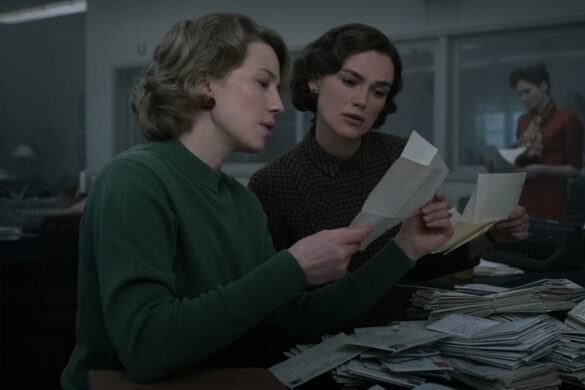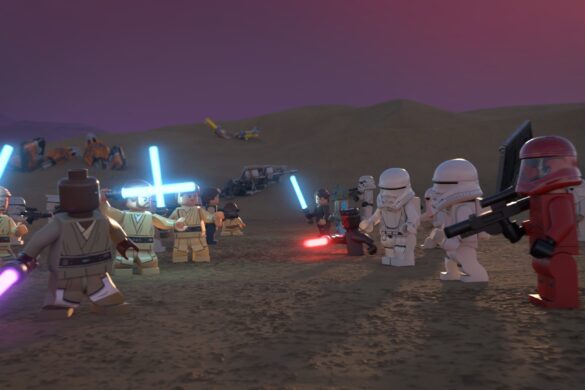Cinema in America is, as is the case with every country, incredibly nationalistic. Multiplexes and theaters all over the US are mostly filled to the brim from screen to screen with mainstream English-language, Hollywood produced products, which (naturally) vary in quality from film to film. However, to quote acclaimed director Bong-Joon Ho from the 2020 Academy Awards, “Once you overcome the one-inch tall barrier of subtitles, you will be introduced to so many more amazing films.” And this is the beauty of a program like J-Screen.
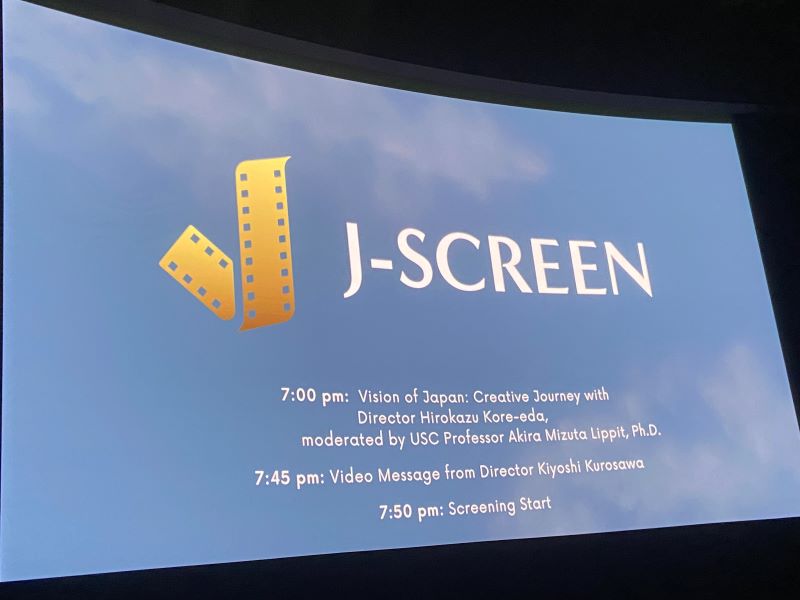
Over the years, thanks to programs like J-Screen, films from all over the globe can now be seen by movie lovers everywhere. This not only allows some of the most incredible international talents to rise up in the American cinema culture, but also allows the industry to flourish with a diverse portfolio of new stories. J-Screen in particular focuses on putting the spotlight on some of Japan’s greatest storytellers. And That’s It LA was incredibly fortunate to attend one such program, highlighting the incredible works of acclaimed filmmaker Hirokazu Kore-eda: the filmmaker behind such well-regarded films as Shoplifters, and Monster.
Kore-eda was able to sit down with USC film professor, Akira Mizuta Lippit, Ph.D, to discuss his career and the impact of Japanese cinema on American culture. Here’s what they had to say*:
NOTE: Kore-eda spoke exclusively in Japanese with a translator interpreting his answers throughout the panel.
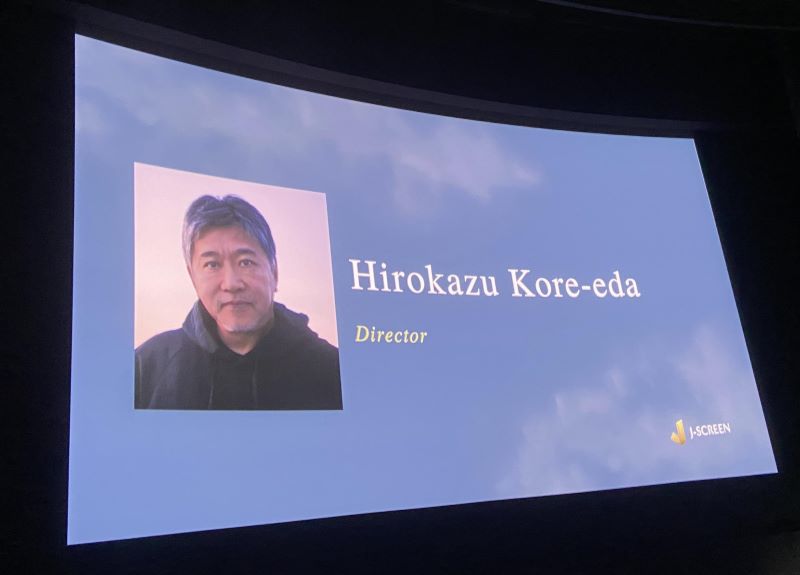
Lippit: It’s really exciting to see so many people here…Our purpose here is to talk about a situation of Japanese film and media, and I can’t think of anyone more worthy to talk about this than director Hirokazu Kore-eda… Our purpose here is to talk about Japanese film media over the last several days. There isn’t anybody more perfect for this conversation, than Kore-eda, in part because he has been making films for 30 plus years. And before then, having a career in television, making documentaries and more recently, making films in France or Korea. Working in a variety of different platforms, so I think he has a wealth of knowledge, both from his own experience as well as a vision of everything that happens around Japanese [cinema]. And I wanted to start today by my earliest memory of seeing…his first feature film, Maborosi…And I was really struck by this remarkable maturity in filmmaking that seemed far beyond his then very youthful age. And so I was hoping that we could ask to begin with, the sort of the situation of that moment in the mid 1990s and what brought you into filmmaking, especially transitioning from working in television and documentary at that moment, what made you want to make feature films at that particular moment?
Kore-eda: So I wanted to work on movies. And after I graduated from school, the studio system sort of collapsed, and I didn’t really know what the entry point was going to be, which is why I started off in TV. Once I started working in TV, I actually found that I was having a lot of fun, and more fun than I thought. And so I was working on some documentaries, and found that I thought I could grow a lot in that world. So I was watching a lot of TV and making a lot of TV, and that was kind of the end of my 20s, beginning of my 30s In the 90s. So in the 80s, there was this group called The Directors’ Company, and we, my generation, of filmmakers, really admired them. They were this kind of cool group of filmmakers that we all aspired to become. And so I would write scripts and send them to directors there. And of course, as a unknown assistant director, it wasn’t easy to just jump into directing all of a sudden, but I did approach them and have a lot of communication with them. And then in the 90s, it was kind of this time where indie films in Japan were starting to sort of come out. And Takeshi Kitano was was having a lot of success internationally, and he was becoming famous. And kiroshi Kurosawa, who whose film you’ll see after this, the generation that didn’t experience studio the studio system essentially came up. And there was also Shinji UI, who is the same age as me, actually, and as a director, he was also doing TV, and then kind of was going into movies, and so that really was kind of the movement in the mid 90s.
What I find so fascinating in listening to your story about wanting to make films but not knowing how to what the entry point was. And of course, Japan, like the United States, had a very strong studio system. Entered as assistant directors and worked their way up to directing. And since that system had largely disappeared. The entry point seemed very hard to find, but I think looking from a distance, Japanese cinema, especially during the 1970s and 1980 was largely people who were established in the 50s and 60s, like the so called shortcut New Wave…and there wasn’t a sense that there was a movement of young filmmakers coming in. Of course, I remember when I first saw external Takeshi, Sonatine and Hanabi, and being so surprised that Vito Takeshi could make films like this. I’m wondering what you felt. Why was there so many new directors suddenly appearing at that moment? You mentioned yourself, Kiyoshi, you i, Shinji, Kala, tsunami, all of them are making their films right around this moment, what? What was the environment like? And why do you think this energy suddenly drops?
I really don’t know…So in terms of the timing of all of this, at the end of the 90s, You know, there was this group of four…we were called Four Ks. And then there were other names also coming up, that were added. But people were, you know, looking at sort of that grouping. And until just recently, like, maybe 2015 or so, there weren’t really a lot of new directors that were coming up and and joining and so within Japan, yes, they were very popular directors, but not so much internationally. And in the last five to six years, I would say there have been some new directors like and, you know, I’ve been asked questions like, What do I think of, you know, Imam and that sort of thing. And about seven or eight years ago, I started hearing the name Hama Gucci and Fukada, the two directors, and they were having some success in Europe. The other directors and buyers and critics in Europe started noticing them and talking about them, and so that actually kind of made me nervous. I thought, Oh no, I’m gonna I might be forgotten if I don’t continue to do great work and so, but it also gave this feeling of like, Finally, there’s some new, this new generation that’s coming through. And I really felt that also this year at Cannes as well.
I think that the other thing, I think, as somebody who’s following Japanese culture very closely, as I was at the time, I felt like the 1980s was really marked by the emergence of very young novelists and writers… It seemed that the literary world had really started to introduce very new young writers in the 80s. And so I was so surprised when suddenly, in the 1990s there was an explosion of new filmmakers. And I was interested to learn how they came into filmmaking. And I know your story from various interviews that you had given and conversations that we’ve had in the past, but one of the things that I was most struck by in your case was we always thought of the previous generation of Japanese filmmakers, certainly the New Wave filmmakers, or even the classical like Kurosawa Akira, being very influenced by western by American films. Remember reading an interview with you early on where you talked about the influence of the Taiwanese filmmaker ho shashan. And I was so surprised to see a Japanese filmmaker talking about the influence that not a Japanese filmmaker or an American filmmaker, but this remarkable Taiwanese filmmaker. And I’m wondering if you, you could tell us a little bit about your thinking about making films, what made you want to make films, what made you want to enter this space as a filmmaker? What were the ideas, what were the things that were motivating you?
Well, I always had this space of loving film and TV and wanting to work in that sphere. But in my teens and in my 20s, I was so naïve. I couldn’t look at people in the eye. I mean, I’m here sitting in front of all of you now, but at the time, you know, I couldn’t work in a group like that was out of the question. And I’m, you know, the generation where Akira Kurosawa’s run was coming out when I was in college, and I applied to be involved, and I I saw him yelling into a megaphone. And I thought, ‘Oh, I definitely can’t do this.’ So I decided to study writing instead and focus on something that I thought I could do…. So in college, it wasn’t like I had, you know, film clubs or anything, where I was working on making films. I did participate in three different TV dramas and go to set and work, but I was totally useless there, and so no one would mentor me. And so I didn’t find any anyone that I could look up to there. And so in in TV, I didn’t have much to do. But then I had the chance to go to Taiwan and meet Coach action and visit his set. I think it was 1993 and I just love his films. I loved his films and as a human, when I met him, I just found he was, he was just an attractive human, and I just fell in love, and I wanted to work with him and talk about films with him, and simply just that, that joy was what really made me want to make films and not just work in TV.
One of the things when I think of the 1990s as opposed to, let’s say, a generation before, is that the environment of the 1990s in Japan is one in which you also have the so called fifth generation of Chinese filmmakers…so Asia is different. You have the start of the Korean Wave. So Korean cinema, Korean entertainment, is emerging. You’ve also made a film in Korea. And then, of course, the so called Taiwanese new wave…were you aware of the sort of presence of a new East Asian media landscape? Were you aware of these things? I mean, obviously you had discovered Ho Xiao Shen and you had covered his work. Or was this a factor? Was this an influence for you? There seems to be an expanded Asian media space around this time. Is this something that you felt at the time?
So the answer is yes, I was definitely aware of that. And I think the wind sort of really changed when Wong Kar Wai started coming up, and it sort of became cool or fashionable, kind of a trendy thing to watch Asian films. And then, of course, you know, in Korea, it was maybe 10 years after that they became their films started coming up. And in Japan, like I mentioned, the director’s company, they were making these films that were different from studio films, and with two directors…and they were just fantastic. And we would go see all of their new films. And internationally, they weren’t really recognized very much. They passed away young, but it’s nice to see new things that they are actually starting to be recognized a little bit.
[There is a] moment where suddenly there was this kind of rejuvenation of Japanese cinema, because there are so many new faces and new filmmakers entering into that space and receiving a lot of attention and making some very, very good films in the process. And then, as you say, for several decades, there isn’t. There aren’t a lot of new filmmakers entering recently. And I think from our perspective here in the United States, we notice, not only are there really wonderful works being made by directors like yourself and from other TVs and many, many others, but there’s also an incredible interest in the theme of Japan in popular culture, in television. Recently, we saw the Shogun series with a large degree of any awards. With the great remarkable episodic series. I’m struck by the fact that we even have Japanese films made by people who are Japanese… And I’m wondering if that environment has created any changes for you in your own work. I’m wondering if this kind of expanded interest in Japanese things, if you think, not only ones I mentioned, but if the last Academy Awards where we had, you know, you know, the Godzilla film won an award, and Ghibli won their regular award, and you had a third nomination of Perfect Days. And so I’m wondering if this has created a change for you, for example, working, or change the environment in which you work at all with suddenly this what feels like an expanded global attention on all things Japanese?
It’s definitely a good thing that Japan is getting all this attention. I’m not entirely sure what the effect is on me and my work….Most people think Japanese films are made by Japanese people in Japan, and there aren’t people outside Japan involved. And so I think it’s important to think about more diversity in the industry of filmmaking in Japan…Most of the industry is more focused on the national market in Japan, and many people in that world think they can continue as they have because it’s worked for so long. But I think there needs to be change to bring something new. And I think without that change that wind that is now blowing is not going to catch that sail, so it’d be a wasted opportunity.
And we all share the same opinion as Kore-eda; not just for cinema in Japan, but cinema in general. Because the more diverse the landscape is, the more voices out there are telling more unique stories, the greater and stronger the art of cinema can persist. It was truly an honor being in the presence of Kore-eda. And we find ourselves always hungry and excited to see what he will bring us next, and how it’ll reshape the industry!
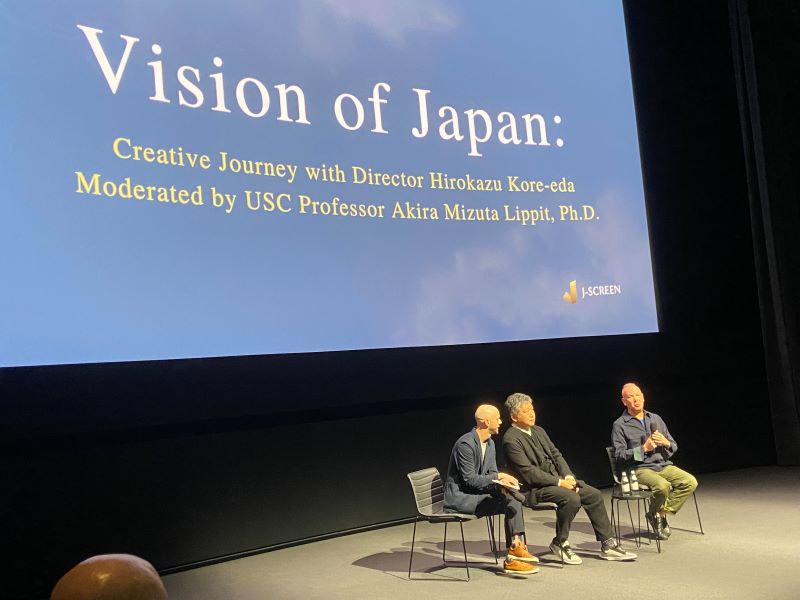
About the author: When not saving the world from apocalyptic circumstances, Mike Manalo is a mild-mannered freelance reporter passionate about attending comic cons, premieres, and screenings. Hobbies include being obsessed with comics, movies, and all things nerdy!





